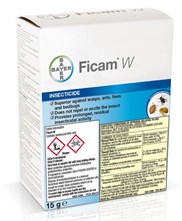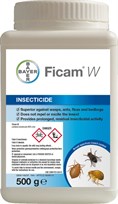On 11 December 2019, Bayer Environmental Science announced that Ficam W (80% bendiocarb WP) was to be withdrawn from the UK market. This follows the withdrawal earlier this year of Ficam W from Ireland.
In their press statement Bayer said that they were disappointed to make this announcement following the significant investment in time and money spent on the resubmission of Ficam W. The removal follows a vote from the EU Biocidal Products Committee.
Although this announcemnet relates to the UK, the withdrawal of Ficam W (80% bendiocarb WP) will be Europe wide and follows the withdrawal earlier this year of Ficam W in Ireland. This announcement also comes hard on the heels of the outdoor usage restrictions imposed on Ficam D (1.25% bendiocarb dust) earlier this year.
 |
 |
Alan Morris, Bayer head of environmental science, explained that this news had been made public as soon as the company had received the official notification from the EU. Exact sell-by and use-up dates will be set by the UK Chemicals Regulation Division (CRD) of the Health & Safety Directorate and will be made public as soon as available.
“It’s expected that there will be a 180-day sell-out period for manufacturers and distributors, followed by a 180-day use-up period for pest controllers, but the Bayer Pest Solutions team will keep the industry informed on all of the latest updates,” explained Alan.
“Ultimately, this product is a big loss to the industry after offering successful pest control for over 40 years. This is another reason why Bayer constantly invests in research and development of new chemistry, to continue to deliver solutions to our customers for the future,” he adds.
From a practical perspective
From a practical pest professionals’ point of view Brian Duffin, chief technical officer for Hampshire-based Rokill, said: “We have used Ficam W for years. It has always been very reliable for a wide range of insects. It has never let us down. Losing Ficam W is yet another product lost from the tool box and follows the impending withdrawal of Fendona.
“We seem to be driven increasingly towards the use of non-toxic products. Let’s hope they work?” he queried.
From a scientific perspective
With a more technical point of view, Clive Boase of the Pest Management Consultancy commented: “The loss of Ficam W (bendiocarb 80% WP) will leave a very significant gap in UK pest controllers’ armoury. For many decades this product has probably been the most widely used indoor residual insecticide in the UK, with a broad range of target pests and the convenience of unit-dose sachets.
“In recent years however, the attribute that has made Ficam W particularly useful, is the fact that it has a different mode of action from that of the pyrethroids. This has resulted in it playing an important role in the sequence and alternation of treatments to control pests that have developed resistance, such as houseflies and bed bugs. Ficam’s loss will therefore force pest controllers to place greater reliance on the remaining insecticide classes, such as the pyrethroids, to which there is already widespread resistance and, to a lesser extent, on the IGRs. In the medium term, this contraction of the armoury may therefore exacerbate existing resistance issues to the detriment of the end customer.
“Looking to the future, the loss of Ficam W may accelerate the introduction of alternative insecticide classes, although this is always a slow and costly process and it may also incentivise the development of non-insecticidal treatments, which are subject to fewer regulatory constraints,” he concluded..
Ficam W has been the main stay of numerous crawling and flying insect control regimes, for example for the control of wasps, ants, fleas and bed bugs, for more years than most care to remember. In fact, younger pest controllers will have grown up with this product. When launched by Fisons of Cambridge in the 1970s, Ficam W set the benchmark for insect control worldwide as it was odourless, non-staining, left no deposits, was highly effective and was presented in sachet format – a first for the industry.
Replacement product from Bayer
As a replacement Bayer explains they have recently launched an alternative solution which will cover most scenarios where Ficam W would have been used – K-Othrine Partix (2.45% deltamethrin).
“Our newly launched product, K-Othrine Partix, which was on display at PestTech 2019, is a broad-spectrum insecticide providing 12-week residual control of a broad spectrum of pests. The state-of-the-art formulation technology has allowed us to reduce the active substance levels in the treatment environment while still offering a high level of control,” he concludes.

